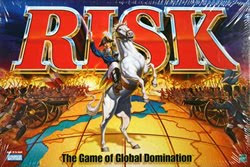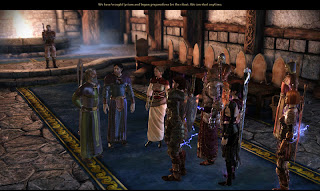When I'm playing a BioWare RPG, I'm aware that there are certain design considerations and rules that they tend to stick to. I know at the start I'm going to be forced down a linear path, before I get the opportunity to pursue one of several quest lines and have the freedom to explore them or anywhere else in the game world. Upon completing those quest lines, and/or doing something else afterwards, I'm going to be forced down another linear path which will bring the game to a close. Typically, as part of each of those major quest lines, I'm going to have to make a "significant" decision which will affect the game some way in the future.
I love BioWare games, and I'm not saying that all their games are the same, despite this (Spoiler warning for this link) tongue in cheek BioWare formula chart, but... there is a certain degree of mystique that's lost on me while I'm playing them now. I know their modus operandi, and while I believe it's a very effective format for giving the player control over the progression of the story and their character, I can't help but feel that they are a little hamstrung by it when it comes to their veteran fans. For new fans, or those not familiar with their format, I imagine Dragon Age is a fairly jaw-dropping proposition. I love it, but even on my initial playthrough, there was something lacking that I couldn't quite put my finger on at the time. What was missing? Risk.
No, not that type of Risk.
What do I mean by "risk"? I always felt "safe" playing the game. Whenever I was about to make a major decision, it felt as though it was telegraphed to me in a notable fashion... almost like I had someone from BioWare standing over my shoulder saying: "look, we're getting you to make another important decision. Think carefully, because it's going to affect things later on." The issue isn't the gravity of the decisions and their consequences, because they are great, but just the fact that as a player, I typically knew which decisions matter and which didn't because I was familiar with BioWare's style.
(Dragon Age spoiler warning) In my first playthrough of Dragon Age, I went straight to Redcliffe and fought my way to the castle. Here I was confronted with a decision to use Blood Magic (which would result in his mother dying) or go to the Circle of Mages in order to save a boy from demonic possession. So I saved the game and decided to head to the Circle, despite the warnings that something bad may happen in my absence. The problem is, as a player, I know I will have time. I know BioWare won't screw me over by having the boy die or something else happen to him while I'm gone. I know that isn't a decision that will actually matter, because I know BioWare's style. (For those who are curious, no, I'm not trying to be Dak'kon here.)
There wasn't a time limit? Actually, no, I'm not surprised.
Even though it would have been annoying for my character's noble intentions to have the boy die, and also for me because I love being able to create the "Hollywood happy ending", I would have loved it even more if I'd been wrong. If he had died or something terrible had happened while I was away because I took too long, even despite some small annoyance and not being able to make everything perfect, the impact of that failure would have been fantastic. (End spoiler) I love being a goody-two-shoes, but at the same time, I really do appreciate when a game makes it really difficult, or even impossible for me to do that. I do like tragedy in games, as long as it makes sense - again, that was the massive failure of Fallout 3.
On that note, Bethesda has a problem with formula too, but I find its main problem is your insignificance in the game world. Throughout Morrowind, Oblivion and Fallout 3, you do all sorts of incredible deeds, be they good or evil. Some of them are extremely public, but due to the scale of the games, nothing really matters that much. It's not possible to cater for choice and for to have a real effect, so you're left with a drops in the pond approach, where you gain points of fame or infamy which can potentially have small effects when you reach a certain level or either. Thus you get a generic reaction to your behaviour, but without a specific reason. The points/rankings that are glaringly displayed on your character's information screen, make it feel like an arbitrary measure applied to you rather than as a genuine reaction from characters based on rumours and your reputation.
Jesus loves me, this I know... cos my Pip-Boy tells me so...
So formulas are great in that they help players know what to expect from a game, and provide a valuable means to provide an interesting and enjoyable gaming experience. However, the danger is that they can lose that magic appeal. Games should place players in unexpected situations from time to time. Players should be forced out of a comfort zone and given something that is a great shock to the system and out of the ordinary. Alpha Protocol does this brilliantly with its dialogue system, forcing the player to react immediately, but in some circumstances it ups the ante even further, because it springs a snap decision on you in completely unexpected circumstances, or forces you to re-analyse a course of action immediately after presenting you with new evidence.
So what I am asking for? I'm asking for the designers to give us something different each time. I'm asking them that instead of tinkering around the edges of their design, smash some of our preconceived notions of their style and produce a curve-ball every now and then. I'm looking for big decisions sprung on you unexpectedly, or seemingly minor decisions coming back to haunt me later on in the game, or otherwise have something break the mould of their usual style as presented to players. Yes, I know, I'm being an unreasonable and demanding gamer, but I want to feel that sense of insecurity that stops me from unconsciously bringing my knowledge as a player to my gaming. Please take gamers out of their comfort zone... it is a lot more fun for them that way, even if they hate you for it initially.







Definitely agree with this blog post. I feel the same regarding Bioware's games and unfortunately I'm really burnt out on them because there is that sense of familiarity... Even with dramatic setting switches (Jade Empire, Dragon Age, Mass Effect...), well... They still don't feel that different from one another when you get past the visuals.
ReplyDeleteIn Dragon Age's defence though (it's my favorite Bioware game), there are some great options that I never would have predicted before the release. I was extremely excited at how my human noble could choose to marry Anora for example. And of course, the Origins themselves are a great evolution of the classic background histories.
I definitely agree with your example regarding Redcliffe. A shame too since I think that might be the most involving quest in the game for me personally.
For Alpha Protocol, something I *really* enjoyed is that the negative consequences wasn't just a "content stopper". Even if you can miss out on some stuff if you're being an idiot to everyone (which makes sense), the game changes convos and stuff like that so it still feels like a viable playthrough.
Likewise with the reputation with characters. It's the best I've seen in easing the player into a role of just making decisions, and not trying to game the system because good influence always yields more content than bad. In AP, bad influence doesn't just shut down content, it changes scenes and the way characters talk to you. You gain different perks from your handlers instead of none.
For all the hubbub about having a male only, Mike Thorton character to play, the game is among the better ones when it comes to encouraging the player to play they want to.